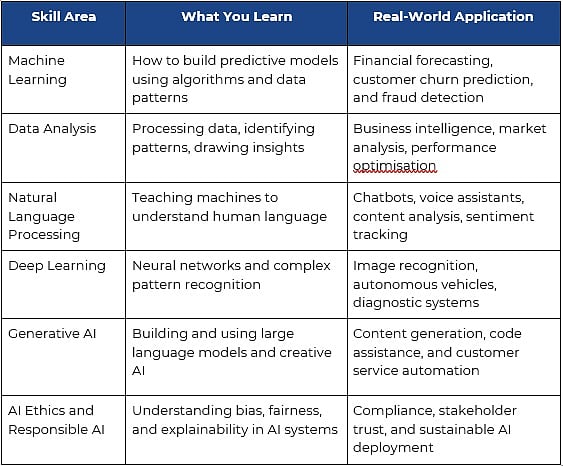5 Reasons Why AI Courses Are Becoming the Fastest Path in 2025
The global AI market is expanding at an unprecedented rate, and organisations across every sector need professionals who can work with artificial intelligence

AI courses are rapidly becoming the fastest career accelerator in 2025 because they equip you with the most in-demand skills in the job market right now. The global AI market is expanding at an unprecedented rate, and organisations across every sector need professionals who can work with artificial intelligence.
When you complete an AI course today, you're positioning yourself for immediate employment opportunities, significant salary premiums, and career mobility across industries. This makes AI education fundamentally distinct from traditional career paths, which typically require years to yield comparable returns.
Employers are actively willing to pay up to 43% - 47% more for AI-skilled professionals compared to their non-AI counterparts, creating a direct financial incentive that makes these courses attractive investments.
1. The Skills Gap Creates Immediate Job Opportunities
One of the most compelling reasons AI courses have become so crucial is the massive gap between AI demand and available skilled professionals.
The demand for AI expertise far exceeds the current supply of qualified workers. Companies across various industries, including finance, healthcare, retail, manufacturing, and technology, are struggling to find individuals who understand the implementation of AI. When you complete an AI course in Mumbai, you're entering a market where employers have urgent, unfilled positions.
Unlike traditional degree holders who compete against thousands for the same roles, AI professionals graduate into an environment where companies are actively recruiting. Your graduation doesn't mean joining a queue of job applicants. It means stepping into positions that companies have been trying to fill for months.
The competition is fierce for experienced professionals, but for newly certified AI specialists, the landscape is entirely different. Many employers are willing to hire fresh talent with proven AI certifications because they need the capacity now. They cannot wait for traditional university pipelines to produce graduates two to three years from now.
2. Rapid Salary Growth and Premium Compensation
Recent data shows that professionals with AI skills earn premium compensation across multiple sectors. In Mumbai alone, AI engineers earn an average of 14.1 lakhs per annum, with experienced professionals reaching up to 20 lakhs.
More importantly, this salary can grow to 15-30 lakhs within just two to three years of experience. This rapid growth happens because AI projects generate measurable business value.
When you help a company optimise operations, improve customer targeting, or automate processes using AI, your contribution directly impacts revenue. Employers recognise this value and compensate accordingly.
Graduates from AI courses in Delhi, who work with investment firms, banking operations, and trading platforms, earn among the highest salaries in India's tech sector.
This isn't speculation about future potential. These are current market rates for people with AI skills today.
3. AI Skills Transfer Across Industries and Roles
Someone trained in AI through quality courses can work in healthcare, finance, retail, marketing, agriculture, or technology. The fundamental skills remain valuable regardless of industry. This creates career flexibility that protects you from industry downturns and opens opportunities across sectors.
This industry mobility is increasingly important in a changing economy. Companies adopting AI rapidly often hire professionals who understand AI principles but are willing to learn their specific business domain. The AI knowledge is the hard part. Learning how a particular company operates is the easy part.
If you're a marketing professional wanting to transition into technology, AI skills provide the bridge. If you're from a non-technical background, AI courses teach you enough technical foundation to work in roles you previously couldn't access. You're not starting from zero in an entirely new field. You're building on a marketable foundation.
4. AI Certifications Provide Immediate Credibility
A recognised AI certification carries weight in ways traditional degrees sometimes don't. When you complete an AI course from a reputable institute, you receive a certification that immediately signals competency to employers.
This matters because hiring decisions occur more quickly with clear credentials. Employers reviewing hundreds of applications can promptly identify certified AI professionals and move them forward in the hiring process.
5. Flexible Learning Models Let You Upskill Without Disrupting Your Life
Modern AI courses offer learning flexibility that makes them genuinely accessible to both working professionals and students. Unlike traditional degree programs that require full-time attendance, quality AI courses are available in multiple formats.
You can learn through online platforms at your own pace. You can choose evening classes if you're working. You can select weekend intensives if you prefer a condensed learning experience.
For students, this flexibility means you can start AI education while completing other degrees or working part-time. You're not making a massive life decision that delays everything else. You're making a strategic addition to your current path.
Core AI Skills That Make You Immediately Employable
Quality AI courses don't overwhelm you with unnecessary theory. They focus on skills employers actually need right now.

These aren't academic subjects disconnected from job requirements. Companies are actively hiring for every one of these skill areas. When you master them, you're learning what employers need.
Why 2025 Is the Critical Year for AI Courses
The rapid evolution of AI tools, particularly generative AI platforms, has accelerated the learning timeline too. Professionals who learned machine learning five years ago now need to understand large language models and prompt engineering.
This creates a situation where even experienced professionals must upskill constantly. For newcomers, starting with modern, AI-heavy courses means you're learning what's relevant now, not what was relevant five years ago.
Frequently Asked Questions
Q: How long does it take to become job-ready in AI after completing a course?
A: Quality AI courses run three to nine months, depending on depth. Most graduates start interviewing within two to three months of completion. Entry-level positions often come within four to six months. Senior positions requiring additional experience take longer, but your foundation is solid immediately after course completion.
Q: Do major employers recognise AI certifications?
A: Yes. Certifications from reputable institutes like IIT Madras, NASSCOM-accredited programs, and industry partners like AWS are actively recognised by employers. In hiring decisions, these certifications help differentiate you from non-certified candidates.
Q: What salary can I expect immediately after completing an AI course?
A: Entry-level AI roles typically start at 4-8 lakhs per annum. This varies by location, institute reputation, and your previous experience. Mumbai and Delhi offer higher starting salaries than smaller cities.
This is an advertorial. The article is being published as received.
Follow us on: Facebook, Twitter, Google News, Instagram
Join our official telegram channel (@nationalherald) and stay updated with the latest headlines
